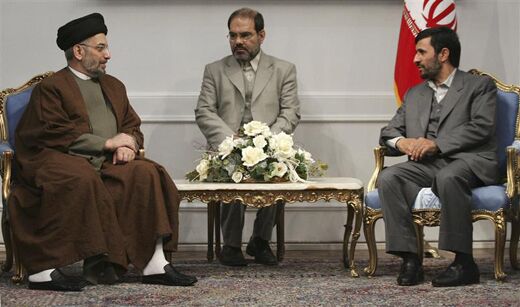
Iran’s Presence in Iraq Continues to Expand
The greatest benefactor of America’s war in Iraq has been Iran. This, according to a United Press International report, is the growing consensus among many Middle Eastern nations. Why? Unwilling as the United States may be to admit it, evidence continues to mount of Iran’s enormous influence in Iraq—a reality only made possible by America’s elimination of Tehran’s top enemy in the region, Saddam Hussein. Clearly, Iran is working hard to secure all that it stands to gain there.
According to Pakistani President Pervez Musharraf’s Inter-Services Intelligence Agency, upi stated, “Tehran’s intelligence apparatus and Revolutionary Guards’ clandestine service were the real victors of Operation Iraqi Freedom. [This] assessment is widely shared by Jordan, Egypt and Saudi Arabia ….”
A handful of recent articles reveal the devastating extent of Iran’s involvement in Iraq, and, regrettably, the level of America’s naivety and weakness in dealing with Tehran.
Iran’s ambassador to Iraq, Hassan Kazemi Qumi, spoke to the New York Times on January 28 about his nation’s plans to greatly expand its economic and military ties with Iraq. James Glanz reported that Qumi “said Iran was prepared to offer Iraq government forces training, equipment and advisers for what he called ‘the security fight.’ In the economic area, Mr. Qumi said, Iran was ready to assume major responsibility for Iraq reconstruction, an area of failure on the part of the United States since American-led forces overthrew Saddam Hussein nearly four years ago.
“‘We have experience of reconstruction after war,’ Mr. Qumi said, referring to the Iran-Iraq war in the 1980s. ‘We are ready to transfer this experience in terms of reconstruction to the Iraqis.’”
Qumi also said Iran was prepared to offer more than just military assistance and aid in rebuilding Iraq’s infrastructure: “In a surprise announcement, Mr. Qumi said Iran would soon open a national bank in Iraq, in effect creating a new Iranian financial institution right under the Americans’ noses. A senior Iraqi banking official, Hussein al Uzri, confirmed that Iran had received a license to open the bank, which he said would apparently be the first ‘wholly owned subsidiary bank’ of a foreign country in Iraq.” Uzri said the move would help trade between the two countries, and Qumi said there would be more Iranian-sponsored banks to come, in addition to other economic initiatives.
But Iran’s reach into Iraq is far from being purely economic. Iran has had its religious, military and political agents working in Iraq even since before the war began. The Trumpet has reported often on the extent of Tehran’s involvement in Iraqi (and all Middle Eastern) affairs.
Reports confirm that Iraqi agents of Iran have received millions of dollars to facilitate terrorist attacks and that the now-infamous Shiite death squads are being financed by Iran. And now, Mojahedin-e-Khalq, the Iranian opposition party, is accusing Iran of sponsoring fully 132,000 of its own agents in Iraq, including “numerous Iraqi Shiite officials and politicians” (Middle East Newsline, February 6). The fact is, Tehran is the number-one financier of terrorism in Iraq.
Last Tuesday, the Wall Street Journal also ran a piece that detailed Iran’s complicity in the quagmire that is Iraq, and the need to deal with Tehran if peace is ever to prevail. Reporting on the recent visit of Mithal al-Alusi, an Iraqi parliamentarian and head of the Iraqi Nation Party, to America, Bret Stephens stated that “the key point, in Mr. Alusi’s view, is America‘s willingness to confront Iran. ‘You Americans are investing billions of dollars in Iraq,’ he says. ‘Three thousand beautiful sons [American soldiers] have been killed. But the Iranians are investing in parties and politicians. Their embassy in Baghdad is larger and more active than yours. Their intelligence is moving on the Iraqi street. And they’re helping Shiite and Sunni gangs’” (emphasis ours).
Iraq is disintegrating before the eyes of the world. Disarrayed political parties are warring against one another; the nation is being torn apart by religious and sectarian division; reports of terrorist bombs killing Iraqi and American soldiers alike come every single day. We must see that Iran is at the heart of this nation-destroying travesty.
Iran’s success in inciting trouble in Iraq is a result of America’s timidity and unwillingness to confront Iran.
The United States—infested with political division so heated it is rapidly dismantling the nation’s reputation, as well as its ability to act decisively on foreign-policy issues—is becoming weaker and weaker in its approach to Iran. America’s willpower is being sapped daily. And Mr. Alusi, unlike most American politicians, is aware of the end result of such a weakened state of mind. “If America loses its will [in this fight] there won’t be peace in the Middle East for 20 years” (wsj, op. cit.).
The most compelling and disheartening angle of these stories is the candor of Iran regarding its intentions in Iraq, and its total lack of fear for American power and influence. The powerful U.S. military is camped on Iran’s doorstep. Tehran is surrounded by more than 100,000 well-armed American soldiers in Iran and Afghanistan. These forces are equipped with an assortment of sophisticated military hardware. By mid-February, two nuclear-powered aircraft carriers and 150 aircraft will be stationed in the waters adjacent to Iran.
And still Iran remains steadfast in pursuing its goal of securing control over Iraq. Broken willpower has left America a hollow superpower. You can be sure other nations and terrorist groups are observing Iran’s defiance and America’s weakness in Iraq.
The explanation of how the U.S. can be a unilateral superpower, yet at the same time have its reputation and image trampled on by a nation like Iran, is one we all need to understand. What is happening in Iraq right now will have a very direct and intimate impact on your life. To learn how, read our free book The United States and Britain in Prophecy.
